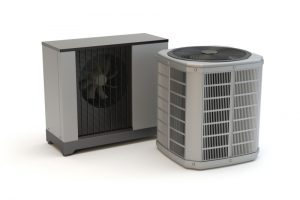
It’s starting to heat up out there. Are you prepared for another summer of trying to keep your home cool? How is your air conditioner doing? If you’re not delighted with how well it’s performing, or if it needs costly AC repair that might not be worth investing in, spring is the perfect time to get that air conditioner replaced. But what should you replace it with?
There are many reasons to consider getting a heat pump in Janesville, WI this time, rather than a traditional air conditioner. If you’re not familiar with heat pumps, you might not be sure why it would be such a good choice. Our handy heat pump FAQ can provide answers to many of your questions about this versatile technology. We’ll explain some of the major benefits of heat pumps. Once you know more about them, you might decide it’s a great idea to replace your AC with a heat pump!
Introduction to Heat Pumps
Heat pumps are quickly becoming the go-to solution for homeowners and businesses seeking an energy-efficient alternative to traditional heating and cooling systems. Unlike conventional systems that generate heat by burning fuel, heat pumps work by transferring heat from one place to another—either from the air or the ground—making them a highly efficient choice for year-round comfort. This process not only helps lower your energy costs but also significantly reduces your carbon footprint, making heat pumps an environmentally friendly option.
There are two main types of heat pumps to consider: air source heat pumps and ground source heat pumps. Air source heat pumps extract heat from the outside air, even in cooler temperatures, and are the most common type found in residential settings. Ground source heat pumps, also known as geothermal systems, draw heat from the ground and offer even greater efficiency, especially in areas with extreme outdoor temperatures. By choosing the right source heat pump for your home, you can enjoy reliable heating and cooling while keeping your energy bills in check.
Efficiency
If you’ve had your air conditioner for several years, or perhaps more than a decade, your efficiency problem isn’t just that old air conditioners are less efficient. That model was less efficient when it was brand-new than today’s models are, and that’s especially true of heat pumps. Modern heat pumps not only offer improved efficiency but also deliver greater reliability and consistent performance.
To achieve maximum efficiency and reliability, it is essential to have experienced installers set up your system. During installation, it is crucial to connect all electrical connections securely to ensure the system operates safely and efficiently.
Cooling and Heating
The truly amazing thing about a heat pump is that it’s reversible. This means it can provide heat as well as taking heat away! New models work even better than those of the past and are a good heating option for even more homes and climates. With a two-in-one heat pump, you stand to save a lot of money on your utility bills.
Heating systems like furnaces and boilers have to generate heat. This uses a ton of energy! But since heat pumps only move heat from one place to another, they use dramatically less energy. You can have greater comfort at a lower cost.
Versatility
Perhaps your home doesn’t have any ductwork. Many older homes don’t. This probably means you’ve been relying on window units for your air conditioning. Heat pumps can work with ductwork, but they don’t require it! Ductless systems are simpler, faster, and less costly to install than ductwork, and they have even greater benefits in terms of high efficiency. In addition, heat pumps can connect to existing radiators in some homes, providing efficient heating without the need for ductwork.
Choosing the Right System
Selecting the right heat pump system for your home starts with understanding your unique heating and cooling needs. Factors like the size of your house, the level of insulation, and your local climate all play a role in determining which system will work best. Air source heat pumps are a popular choice for many homeowners because they are straightforward to install and maintain, while ground source heat pumps provide superior efficiency and long-term energy savings.
To ensure you get the right heat pump for your space, it’s essential to work with a qualified HVAC contractor. They will perform a manual J load calculation, which takes into account your home’s square footage, insulation quality, and typical outdoor temperature. This calculation helps determine the correct heat pump size and system type, ensuring your new installation will efficiently meet your heating and cooling demands. By investing in a professional assessment and installation process, you can maximize comfort, efficiency, and cost savings for years to come.
The Heat Pump Installation Process
The heat pump installation process begins with a thorough site assessment by a certified HVAC contractor. During this initial step, your contractor will evaluate your home’s heating and cooling needs and identify the best location for the outdoor unit. The installation process is complicated and cannot be simplified to just disconnecting wires from the old unit and connecting a new one. Once the planning is complete, the installation process moves forward with connecting refrigerant lines and electrical wiring, as well as installing the indoor unit, which may be integrated with your existing furnace or hot water system.
A successful heat pump installation relies on following a detailed, step-by-step guide to ensure every component is installed correctly and operates efficiently. This includes testing the system, calibrating the thermostat, and making sure all connections are secure. The installer will also check for any refrigerant leaks after the heat pump installation. Working with an experienced contractor is crucial, as a properly installed heat pump system will deliver optimal energy savings, reliable performance, and long-lasting comfort for your home.
Heat Pump Incentives
If you choose a heat pump instead of a traditional air conditioner, you’ll save money when your electric bills arrive. But you’ll save even more than that! The Inflation Reduction Act of 2022 will provide a big reduction to the amount you’ll have to pay for your heat pump. This legislation aims to reduce America’s energy costs and increase green energy production and jobs in that field. Plan your heat pump maintenance to maximize the efficiency and longevity of your system once installed.
The way you’ll benefit directly if you choose a heat pump is through a HEEHRA rebate. Depending on your household income, you could save up to $8,000 on a new heat pump. This means that an air conditioner would be the more costly choice, and a heat pump would be significantly more affordable. You might even be able to cash in on state rebates as well! Many rebate and incentive programs require that heat pump installations are performed by certified contractors or a qualified installer to ensure proper setup and eligibility for savings. After the installation, a walkthrough of what was done should be completed with the customer to ensure satisfaction and understanding of the system.
We’d be delighted to help you sort through your options and benefits for a heat pump so you get the best possible deal on the system you’ll be happiest with. Learn more about how heat pump technology can help you make the most of your comfort and energy savings this season.
Maintenance and Repair
Keeping your heat pump system in top shape requires regular maintenance and prompt repairs when needed. Routine tasks such as cleaning or replacing air filters, inspecting refrigerant lines, and checking electrical connections help your system run efficiently and extend its lifespan. Scheduling annual maintenance with a qualified HVAC contractor ensures that your heat pump is thoroughly inspected, tuned up, and ready to handle both heating and cooling demands throughout the year. Additionally, the cleanup process involves loading up all material and old equipment taken away from the home after installation, leaving your space tidy and ready to enjoy.
If your heat pump system experiences any issues, it’s important to contact a professional contractor for repairs as soon as possible. Timely maintenance and repairs not only help maintain energy efficiency and lower energy costs but also ensure your home stays comfortable, even during colder weather. By staying proactive with maintenance, you can enjoy reliable heating and cooling, reduced energy bills, and peace of mind knowing your system is operating at its best.
You can always count on 24-Hour Home Comfort Services, your heating and cooling specialists.

